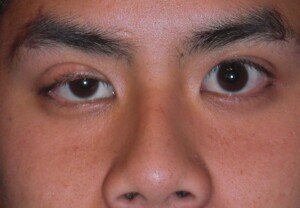
An eyelid that’s suddenly drooping can be frightening to anyone who knows that a brain aneurysm can cause this, but can TMJ disorder also cause this unnerving symptom?
“Drooping eyelid is not a typical symptom of TMJ disorder, but it is sometimes present in patients suffering from TMJ disorders,” says Brijesh Chandwani, DMD, BDS, Diplomate, American Board of Orofacial Pain, with Connecticut & NY TMJ.
“TMJ disorders usually affect the jaw muscles, and the muscle which causes drooping is a facial expression muscle,” continues Dr. Chandwani.
In other words, the muscle that’s involved in a drooping eyelid (also known as ptosis) is located IN the eyelid – not the jaw or anywhere near the mouth or ear.
“In certain cases the jaw and facial muscles do show signs of fatigue (or overworking), and patients may have a feeling of drooping eyelids,” says Dr. Chandwani.
But don’t confuse a sensation of ptosis with actual ptosis, in which a person has trouble controlling the tiny levator muscle in the eyelid.

Ptosis
“I have also encountered TMJ disorders in combination with an autoimmune disorder or a headache disorder which could be causing the drooping eyelid,” says Dr. Chandwani.
“Drooping eyelid should not be neglected; a consultation with a neurologist is warranted as soon as it is experienced, as it could be a sign of a tumor or a nerve disorder (Bell’s palsy).”
If you notice that one of your upper eyelids seems to be a little lower than the other, you have no other symptoms, and you’re over 40, this is likely due to age.
It’s actually rather common for middle aged people to begin noticing that one of their eyelids “hangs” lower than the other. Gravity tends to do that with the face over time, and this effect is often more noticeable on one side.
Of course, by coincidence, you may also happen to have TMJ disorder.
But a sudden onset of ptosis that’s very obvious is more concerning.
Here is more information on the many causes – including serious – of a drooping eyelid or ptosis.

Dr. Chandwani has 10+ years of experience focusing on TMJ disorders and sleep disorders.
 Lorra Garrick has been covering medical, fitness and cybersecurity topics for many years, having written thousands of articles for print magazines and websites, including as a ghostwriter. She’s also a former ACE-certified personal trainer.
Lorra Garrick has been covering medical, fitness and cybersecurity topics for many years, having written thousands of articles for print magazines and websites, including as a ghostwriter. She’s also a former ACE-certified personal trainer.
.











